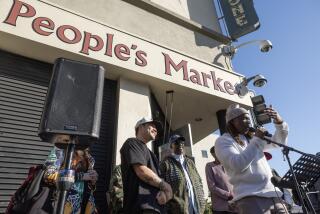A Dialogue, Five Years Later
- Share via
As Brenda Shockley and Angela Oh sat down over lunch at a downtown restaurant to discuss the fifth anniversary of the 1992 riots, they had mixed feelings about assessing the state of the city.
Shockley, 50, an attorney, is president of Community Build, a private nonprofit economic development corporation started in the wake of the riots and initially financed by African American organizations.
Oh, 41, a practicing attorney, has been involved with various Asian American organizations as well as other business and community groups working on economic development initiatives in Los Angeles.
Shockley, who is African American, and Oh, a second-generation Korean American, have known each other since the riots, when each became a prominent voice in their communities.
Both say they feel the limelight has been double-edged. Shockley speaks of how a California female lawyers’ function in the year after the riots soured her on what she calls “roadshows”--forums where she and the other participants were compelled to become combatants, staking out overly simplified points of view.
This edited dialogue, moderated by Times staff writer CARLA HALL, begins as Oh explains why she chafes at the role of Asian American spokesperson--a role she says she did not seek and has brought her criticism.
*
Oh: I did my best to keep the dialogue going and to try and articulate a point of view that I didn’t think was out there. But it’s really brought a lot of wrath in my direction. Over 80% of our community is foreign-born. It’s very resentful that a second-generation person should step out, but there really was a void at that point in time [right after the riots], and I still believe that today. . . .
Everything was about being victimized, and it was much bigger than that. It was about large failures and we were one piece of that in this whole thing that happened. . . .
I don’t consider the riots to be civil unrest. I mean I think that it was, but when I talk about it, I talk about the riots. . . . I was on 8th Street, I was going to Koreatown on April 30 and May 1 and 2--it was chaos . . . and I have a real hard time with “rebellion.”
Shockley: I don’t have a need to call it anything. I really don’t. I mean I’ve never been attached one way or the other to any of the words. . . .
I was thinking that the last time I actually saw Angela was, for me, an unpleasant experience, because it was the California women lawyers event.
Oh: Right, right, right.
Shockley: Now here we are--she’s coming from 8th Street in her community, I’m coming from South-Central. We’re put on display. In order to make it, shall we say, interesting, you ended up being cast in a role; Angela and I ended up sort of at one another. I didn’t have any quarrel with her. But she was required to represent the Korean point of view--whatever that happened to be that day. I was expected to defend or represent the African American community. And, as far as I’m concerned, then and now, it really wasn’t about that.
A friend of mine said to me, “You know this is such a classic failure of a social contract.” She said, “If it wasn’t so sad and if there wasn’t so much human and other kinds of loss involved, it would be a laboratory in the failure of the social contract between the system and the people. . . .”
When I think back over the last five years, frankly I actually think relations are much better. I think they’re more honest.
Oh: Among some.
Question: So how are Korean American [and] African American relations five years after the riots?
Shockley: I deal with Korean parents because my son has Korean friends. Our relations are fine. . . . Through my son’s friends, I’ve seen the life of the immigrant that I would not otherwise have seen. I see a mother who goes to Korea and works for a certain number of months in order to come back here. . . . We told her we’d take care of getting her son to birthday parties and things like that. And, you know, she and I, we’re not great friends. We are two parents raising our children and being a form of a support system.
Oh: I really do believe that that’s the place where the change of heart will come about. That’s what has to happen in order for the politics to follow. It has to be about trust, really.
Q: We’ve reported that only about a third of the Korean American grocers who lost their stores in the riots have rebuilt.
Oh: Less than that, probably. . . . There’s a lot of frustration and anger.
Q: Who’s that directed toward?
Oh: People who are perceived to have been able to make it better [for the community] and didn’t. It can include lawyers. It can include ethnic groups. It can include politicians. It can include community leaders.
Q: But aren’t they angry at whoever they think burned them out of their lives?
Oh: It is not directed at any one group. Although the animosity is there and I don’t find it having gotten better. I think perhaps among private people, things have gotten better. People have established friendships in some instances that would not have been established if this had not occurred in L.A. five years ago. But the thing is that I don’t believe things have gotten better. And it’s both ways. I hear it on the Korean side where young people just don’t want to go beyond their Korean friends.
And I had a call literally two nights ago from a guy who didn’t know what to do with a remark that he heard at work. [The caller told Oh that he had heard a young African American man at a company speak derisively of Koreans.] The African American in a very matter-of-fact way talked about how you know the Koreans, and how dishonest these folks are. . . .
You know there’s good and bad in every group. It hurts me a lot that every time I read about anything that mentions Koreans, it seems like it’s something that’s very unflattering or downright horrible--whether it’s being involved in espionage or being involved in dirty contributions to campaigns or not serving somebody who’s African American in your hat shop or shooting another teenager or eating dog meat or only caring about sending your kids to Harvard. I mean, there are other things.
Shockley: If it makes you feel any better, my son thinks that all Koreans--he wants to be a businessman because he thinks all Koreans have Mercedes.
Oh (chuckling): I don’t.
Q: Do you think there are people angry at poor blacks or Latinos because they think the riot was caused by a poor sliver of those communities?
Shockley: I think it’s maybe more that people have written off that segment. . . . People really do contain themselves in a smaller area--people who don’t go below Sunset and don’t go east of Sepulveda. But what they’ve done is become their own captives as well. . . . Ultimately, there’s a class issue. That has to be addressed.
My work is dealing with that incredible and growing gap of people that don’t even have access to the route to get to where others are. You’re talking about a whole group of people from a class perspective who have only the power to destroy. They didn’t have a say-so, they didn’t have this or that. And that’s not to excuse any behavior. But it tells me where my starting point is. And what I’ve seen, having done housing, having done sort of general economic development, having done policy--nothing changes a person more dramatically, more permanently, more quickly than a job and a living wage. How they think of themselves, how they relate to others, how they relate to the community around them, their sense of their own responsibility and their worth.
I admire the fact that you can get any and everything you need if you’re a Korean in a Korean community. I think that the immigrant experience is the controlling model now.
Q: As head of a pretty high-profile organization, how would you rate yourself? I’ve heard people say that they don’t think Community Build has built anything.
Shockley: Well, the fact is we haven’t. We’re about to start building. There really is a process, and because you need it tomorrow doesn’t mean that it’s there tomorrow. There is so much that goes into building.
And the other thing is that there are all kinds of capital. We’re focusing on human capital. I am as proud of every person that’s gotten a job, of every person who’s gotten training or a GED or bus tokens from us, or an interview, or child care--I’m as proud as I would be of any bricks and mortar that are coming or that we will build later.
Community Build can’t call Wells Fargo and say, “Open a line of credit and we’ll start tomorrow and don’t worry about it, I’ll catch up with the payments. . . .” I think if you’re in it for the long haul, there’s so much that has to be done. That’s one of the reasons people get discouraged and leave-- because the process is much longer than they expect. But you know that if you stop, it certainly isn’t gonna happen.
Q: How would you sum up how you feel five years later?
Oh: In terms of the people that were directly affected and suffered losses, I feel a tremendous amount of frustration because there was a very brief window of time in which I think that ethnic Koreans from all walks of life came together and then--as happens in all communities, I think--there was a breakdown. Yes, there was talk about let’s get the first and second generation together to move forward in this society, in this new adopted home, but when it wasn’t convenient anymore then suddenly there are misunderstandings: “Oh, you don’t speak [Korean] well enough to understand.” That’s a fallacy. It’s not about that. It’s because there are philosophical differences. . . .
The places where I will make an effort to go out and speak are to young people in colleges and universities where they’re spending their time sort of thinking about, “Where do I need to go with my talent and my ideas and my hopes for the future. . . .” When I look to our youth, I have hope.
Shockley: [This conversation] is a snapshot of Angela and myself sort of five years removed. The last thing I want to do is represent that I can solve all the problems that we have. These problems really are organic. And we’re really coming some distance just in being able to identify many of the symptoms.
More to Read
Sign up for Essential California
The most important California stories and recommendations in your inbox every morning.
You may occasionally receive promotional content from the Los Angeles Times.













